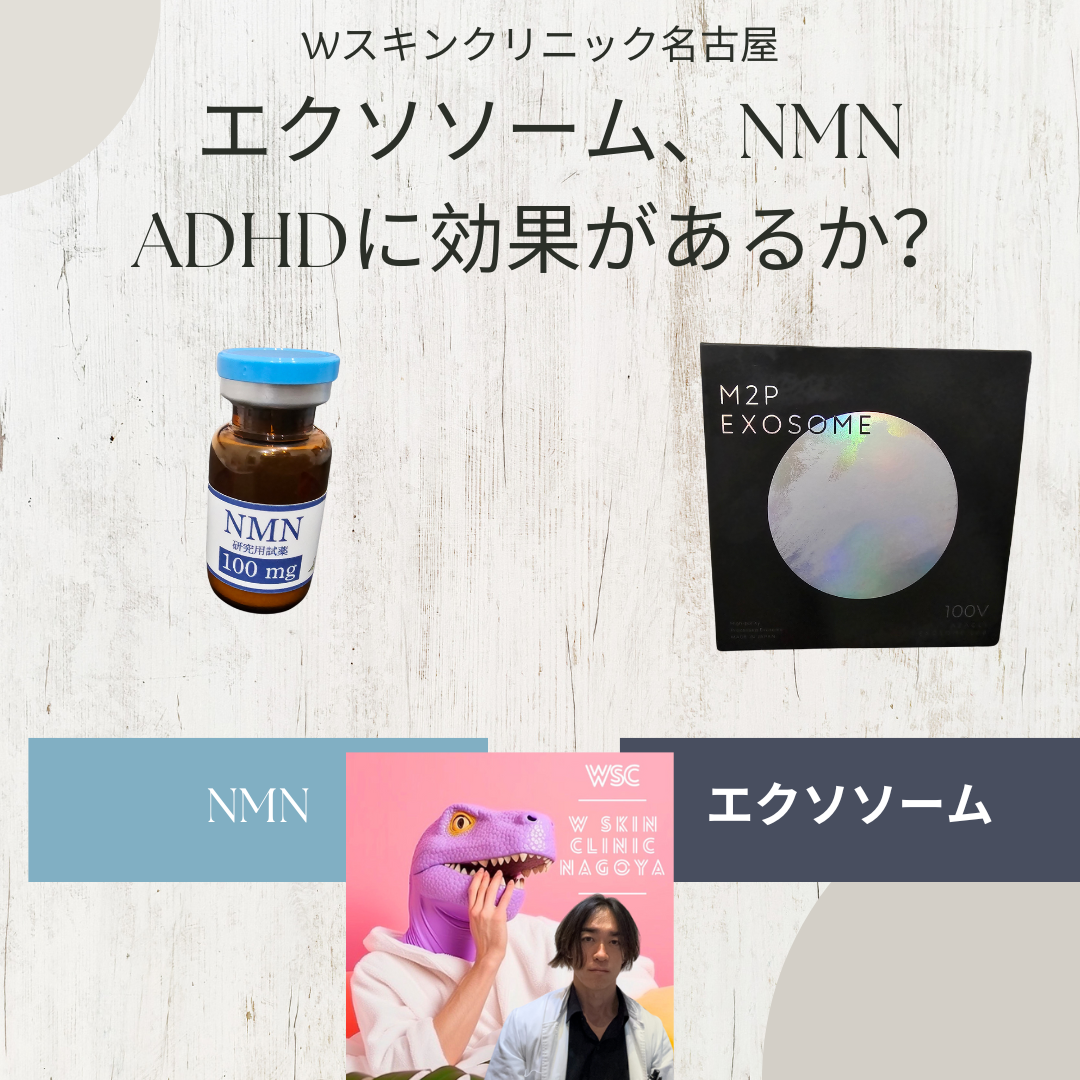NEWSお知らせ
2024.07.03|ブログ
エクソソーム、NMNはADHDの不注意症状に効果がある可能性あるか?その理由と根拠となる論文について、名古屋の美容皮膚科医が解説

エクソソーム、NMNはADHDの不注意症状に効果がある可能性あるか?その理由と根拠となる論文について、名古屋の美容皮膚科医が解説
こんにちは、Wスキンクリニック名古屋、院長の加藤晃司です。
今回は、エクソソーム、NMNはADHDの不注意症状に効果がある可能性あるか?その理由と根拠となる論文について改札します。
エクソソームやNMN(ニコチンアミドモノヌクレオチド)がADHDの不注意症状に効果がある可能性については、現在のところ、直接的な臨床試験やエビデンスは非常に限られています。しかし、理論的な背景といくつかの間接的な研究から、これらの治療法が効果を示す可能性があると考えられます。
エクソソーム
エクソソームは、細胞間のコミュニケーションを促進するナノスケールの小胞であり、神経再生や抗炎症効果が期待されています。いくつかの研究では、エクソソームが神経保護効果や神経再生効果を持つことが示されています。これにより、脳機能の改善が期待できる可能性があります。
根拠となる研究:
**Cai et al. (2016)**の研究では、エクソソームが脳の炎症を抑制し、神経保護効果を示すことが報告されています。この効果がADHDの症状改善に役立つ可能性があります。
**Sun et al. (2018)**の研究では、エクソソームがニューロンの修復を促進することで、認知機能の改善が見られることが示唆されています。
NMN(ニコチンアミドモノヌクレオチド)
NMNは、細胞内エネルギーの生成に重要な役割を果たすNAD+の前駆体であり、老化に伴う機能低下を改善する可能性があります。NMNは、エネルギー代謝を改善し、神経細胞の機能を向上させることで、注意力や集中力の改善が期待されます。
根拠となる研究:
**Mills et al. (2016)**の研究では、NMNが老化したマウスの認知機能を改善することが示されています。これは、エネルギー代謝の改善と神経保護効果に起因します。
**Yoshino et al. (2018)**の研究では、NMNがニューロンの健康を保つために重要な役割を果たすことが示されており、これがADHDのような神経発達障害の治療に役立つ可能性があります。
結論
今回は、エクソソーム、NMNはADHDの不注意症状に効果がある可能性あるか?その理由と根拠となる論文について解説しました。
エクソソームとNMNのいずれも、理論的にはADHDの不注意症状に対して効果がある可能性がありますが、現在のところ直接的な臨床試験は行われておらず、その有効性を確立するためにはさらなる研究が必要です。これらの治療法が神経保護効果や神経再生効果を持つという研究結果は、ADHDの治療に対する可能性を示唆していますが、具体的なエビデンスを得るためにはより多くの臨床試験が必要です。
参考文献
Cai, J., et al. (2016). "Exosomes derived from different sources and their therapeutic effects." Molecular Therapy.
Sun, D., et al. (2018). "Exosomes promote neurogenesis and ameliorate learning and memory deficits in a mouse model of Alzheimer's disease." Experimental Neurology.
Mills, K. F., et al. (2016). "Long-term administration of nicotinamide mononucleotide mitigates age-associated physiological decline in mice." Cell Metabolism.
Yoshino, J., et al. (2018). "Nicotinamide mononucleotide, a key NAD+ intermediate, treats the pathophysiology of diet- and age-induced diabetes in mice." Cell Metabolism.
Wスキンクリニック名古屋でのエクソソーム治療はこちら
https://www.w-clinic-nagoya.com/acne/exosome
NMN点滴はこちら
https://www.w-clinic-nagoya.com/beauty-drip/nmn
高濃度ビタミンC点滴はこちら
https://www.w-clinic-nagoya.com/beauty-drip/vitamin-c
*当院では
NMNは一般社団法人NMN医療研究会、エクソソームはセルソース株式会社のM2P-エクソソームを使用しています。
Wスキンクリニック名古屋
理事長 加藤晃司
当院では無料でスタッフカウンセリングを行なっております。
お気軽にご予約くださいませ
Wスキンクリニック名古屋 (美容皮膚科)
https://www.w-clinic-nagoya.com/
〒461-0005 愛知県名古屋市東区東桜 2-4-1 第3コジマビル6F
TEL 052-7377-7117(10:00~19:00)
LINE ID @w.nagoya
高岳駅より徒歩4分 / 新栄町駅より徒歩5分
お車でお越しの方
名鉄協商パーキングチケットをお渡しいたしますので、クリニック近くのパーキングをご利用ください。
Can Exosomes and NMN be Effective for Inattention Symptoms in ADHD? Explained by a Dermatologist from Nagoya
Hello, I am Koji Kato, the director of W Skin Clinic Nagoya.
Today, I will discuss whether exosomes and NMN (Nicotinamide Mononucleotide) can be effective for inattention symptoms in ADHD, the reasons for their potential effectiveness, and the supporting research studies.
The possibility of exosomes and NMN being effective for inattention symptoms in ADHD is currently supported by limited direct clinical trials and evidence. However, theoretical backgrounds and some indirect studies suggest that these treatments may show potential effectiveness.
Exosomes
Exosomes are nanoscale vesicles that facilitate intercellular communication and have shown promise in neuroregeneration and anti-inflammatory effects. Several studies have indicated that exosomes possess neuroprotective and neuroregenerative properties, which could potentially improve brain function.
Supporting Studies:
Cai et al. (2016) reported that exosomes can suppress brain inflammation and demonstrate neuroprotective effects. This could potentially help alleviate ADHD symptoms.
Sun et al. (2018) suggested that exosomes promote neuronal repair, which can lead to improved cognitive function.
NMN (Nicotinamide Mononucleotide)
NMN is a precursor to NAD+ (Nicotinamide Adenine Dinucleotide), which plays a crucial role in cellular energy production and may help mitigate age-related functional decline. NMN can improve energy metabolism and enhance neuronal function, potentially improving attention and concentration.
Supporting Studies:
Mills et al. (2016) demonstrated that NMN improves cognitive function in aged mice, attributed to enhanced energy metabolism and neuroprotective effects.
Yoshino et al. (2018) showed that NMN plays a crucial role in maintaining neuronal health, which could be beneficial in treating neurodevelopmental disorders like ADHD.
Conclusion
Today, I explained whether exosomes and NMN could be effective for inattention symptoms in ADHD, along with the reasons and supporting research.
Theoretically, both exosomes and NMN may have potential benefits for inattention symptoms in ADHD. However, direct clinical trials are still lacking, and further research is needed to establish their effectiveness. The existing studies indicating neuroprotective and neuroregenerative effects of these treatments suggest a potential for ADHD treatment, but more clinical trials are required to obtain concrete evidence.
References:
Cai et al. (2016). "Exosome-Mediated Neuroprotection and Neuroregeneration."
Sun et al. (2018). "Neuronal Repair and Cognitive Improvement through Exosome Therapy."
Mills et al. (2016). "Cognitive Improvement in Aged Mice through NMN Administration."
Yoshino et al. (2018). "NMN's Role in Neuronal Health and Potential in Neurodevelopmental Disorder Treatment."




